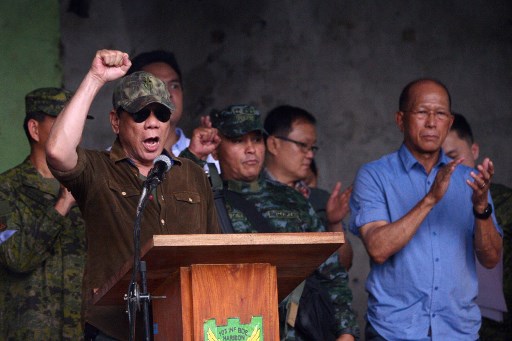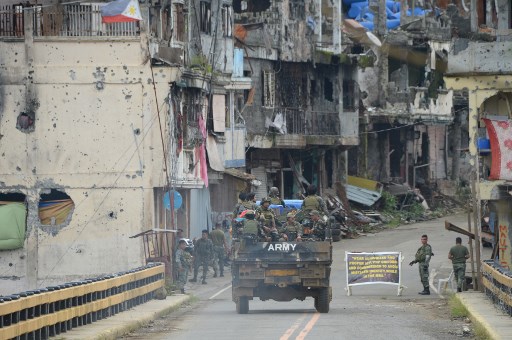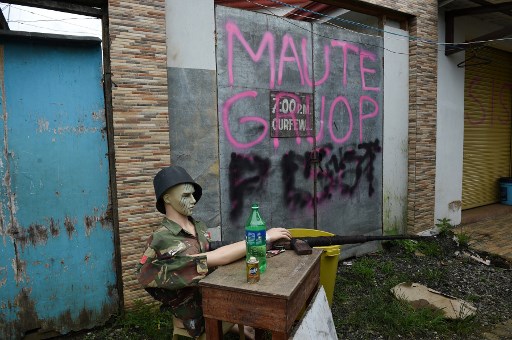(Young Voices Speak is eaglenews.ph’s blank space for the youth to share their opinions, views, and perspective on any topic, issue, or matter)
By Mendy Amarondon, Precious Joshua Corpuz and Daryll Jane Jemino
Young Voices contributors
At last came the long-awaited moment. After months of military offensive, the conflict in Marawi City has finally come to an end.

Philippine President Rodrigo Duterte on October 17 declared a southern city “liberated from terrorists’ influence” but the military said the five-month battle against militants loyal to the Islamic State group was not yet over. / AFP PHOTO / Ted ALJIBE
“I hereby declare Marawi City liberated from the terrorist influence that marks the beginning of rehabilitation of Marawi,” said by President Rodrigo Duterte when he visited Marawi last October 17.
According to government reports , the clashes began during an offensive in Marawi to capture Isnilon Hapilon, the leader of the ISIL-affiliated Abu Sayyaf group, after receiving reports that Hapilon was in the city, possibly to meet with militants of the Maute group. A deadly firefight erupted when Hapilon’s forces opening fire on the combined Army and police teams, and called for reinforcements from the Maute group — an armed group that pledged allegiance to the Islamic State, and which is believed to be responsible for the 2016 Davao City bombing, according to military spokesmen. And on October 16, 2017, Isnilon Hapilon is declared dead.
But what is really the effect of such an announcement?
Still a long way to go

Despite the death of the two leaders of the Maute Group along with their other members, there’s still a long way to go for our countrymen in Marawi.
The question is, is this really the end of terrorism?
If we really want war to end, we are going to have to work to end it. Even if you think war is lessening, it won’t continue doing so without work. And as long as there is any fighting, there is a significant danger of widespread war. Wars are notoriously hard to control once begun. With nuclear weapons in the world, any war-making carries a risk of apocalypse. War-making and war preparations are destroying our natural environment and diverting resources from possible rescue efforts that would preserve a habitable climate. As a matter of survival, war and preparations for war must be completely abolished, and abolished quickly.
One of our primary targets therefore is false beliefs, propaganda, a broken communications system. War does not necessarily produce racism, and racism does not necessarily produce war. But racist thinking makes some of our friends and neighbors more accepting of war against different-looking people. Of course, we need to abolish racism anyway, apart from its contribution to militarism.
End terrorism

The battle for the southern city of Marawi, the Islamic capital of the mainly Catholic Philippines, lasted more than four times longer than the US-led campaign to liberate Manila from Japanese World War II occupation forces. / AFP PHOTO / Ted ALJIBE /
Along with the need for urgent measures to combat terrorism, it is necessary to identify and investigate the factors that give rise to this dangerous phenomenon: the socio-political, historical, ideological, and economic factors. Without the study and analysis of these factors, a complete victory over terrorism is not possible. It is also necessary to identify an agreed definition of “terrorism”, which would bring the anti-terrorist struggle out of the circle of theoretical discussions on the level of the real, effective actions to combat terrorism.
The only way to truly end terrorism is to look at what we fear and deal with it. This is something we can do. We value life more than death, and that is the tool that terrorists use against its victims. The belief that life is more precious than death, would weaken and lessen terrorism.
Sources:
http://cnnphilippines.com/news/2017/10/17/Marawi-liberation-Duterte.html
http://www.sunstar.com.ph/manila/local-news/2017/10/13/duterte-marawi-crisis-almost-over-569311
 Mendy Amarondon is a 4th Year AB Mass Communications student from New Era University. She has directed musical plays, served in the student council, and had been a lead actress in an original musical play. During her spare time, she reads mystery novels and science fiction.
Mendy Amarondon is a 4th Year AB Mass Communications student from New Era University. She has directed musical plays, served in the student council, and had been a lead actress in an original musical play. During her spare time, she reads mystery novels and science fiction.
 Precious Joshua Corpuz is a 4th Year AB Mass Communications student in New Era University. Aside from games, he is also into cars.
Precious Joshua Corpuz is a 4th Year AB Mass Communications student in New Era University. Aside from games, he is also into cars.
 Daryll Jane Jemino is a 4th Year AB Mass Communication student in New Era University. When not engaged in theater and TV production, she spends her time making documentaries, music videos and films.
Daryll Jane Jemino is a 4th Year AB Mass Communication student in New Era University. When not engaged in theater and TV production, she spends her time making documentaries, music videos and films.
(edited by Jay Paul Carlos, additional research by Vince Alvin Villarin)








